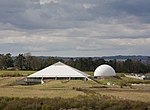Boomtown (festival)

Boomtown (also known as Boomtown Fair) is a British music festival held annually on the Matterley Estate in South Downs National Park, near Winchester, Hampshire. It was first held in 2009 and has been held at its current site since 2011. Its diverse line-up of bands, DJs and speakers perform on many different stages each a part of a district with its own individual theme. Each yearly event is known as a Chapter and expands on the story line from the previous year, told through the sets, live actors and many forms of alternate reality games. The festival site is split into several districts, and the narrative is reflected in the design of the districts, streets and venues, which are populated by hundreds of actors to play the role of inhabitants. The large scale of the sets and infrastructure require six weeks of construction, and a month of disassembly.The event is centered around a set of common beliefs and principles, mainly supporting the progressive ideas of environmentalism and social equality, as set out in its vision code, The Six Pillars of Boomtown.The festival is run by Boomtown Festival UK Limited, partially owned by Live Nation UK (18%), and originally founded by company directors Chris Rutherford and Luke Marcus 'Lak' Mitchell, both from Bristol. In July 2019, the organizers were granted a capacity increase by Winchester City Council, bringing the total number of people allowed to 66,000 capacity.The increase was to come into effect from 2020, but the event was cancelled due to the COVID-19 pandemic. After the rebooted 2021 event, and a smaller-scale event known as 'Boom Village', were both cancelled due to the pandemic - citing a lack of insurance support from the British government, the festival returned in 2022.
Excerpt from the Wikipedia article Boomtown (festival) (License: CC BY-SA 3.0, Authors, Images).Boomtown (festival)
The Stairs, Winchester Itchen Valley
Geographical coordinates (GPS) Address Nearby Places Show on map
Geographical coordinates (GPS)
| Latitude | Longitude |
|---|---|
| N 51.051388888889 ° | E -1.2455555555556 ° |
Address
The Stairs
The Stairs
SO21 1HW Winchester, Itchen Valley
England, United Kingdom
Open on Google Maps









